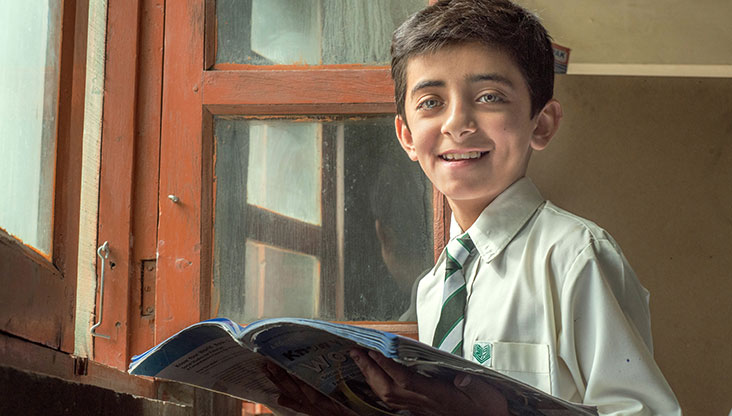
It is a bit unusual for parents to proudly tell the teacher that their kids are glued to the television first thing in the morning. But when classrooms move to the TV screen, it is a great thing for a teacher to hear.
And this is the kind of feedback Aga Khan Education Service, Pakistan (AKES,P) teachers are getting from across Gilgit-Baltistan and Chitral since AKES,P launched its Digital Learning Programme on May 11 in the wake of school shutdowns due to the Coronavirus.
The transmission runs Monday to Saturday on cable TV in those of areas of Gilgit-Baltistan and Chitral where AKES,P schools are situated, and covers the curriculum from grade 1 to grade 8.
The first hour and 20 minutes every day is common for all age groups and includes a Quran lesson, a personal development session, and an indoor physical education class. 40-minute slots for each grade follow. They include tutorials, lectures and demonstrations on different subjects and topics and cover the required coursework. No wonder parents and teachers are happy to see children in front of the television screens.
But students haven’t simply been tasked with watching tutorials. They have also been given study packs for all the different subjects that provide exercises to be completed with the help of the digital tutorials. The exercises, which will be submitted by the students once the schools reopen, ensure that the concepts covered in the digital classroom are reinforced through practice and revision.
The feedback from the parents and students on this new way of teaching and learning has been overwhelmingly positive. Parents’ biggest concern during this uncertain time has been on how to keep children indoors and productively engaged; this has been largely addressed through AKES,P’s Digital Learning initiative.
Ali Nigah, whose three children and niece study in Aga Khan School, Booni in grades 1, 7 and 9, says that his kids are learning a lot. “Children watch the content not just for their own class but for other classes as well, so they are learning a wide variety of concepts and topics. The television is on in our house during the entire transmission.”
Ali Nigah’s experience is replicated in many homes, and has led to greater interaction and collaboration amongst siblings. Arshi Ghulamuddin, a grade 4 student in Aga Khan School, Garden, Karachi who is currently in Gilgit-Baltistan with her family, says that she not only watches the lessons for her own class but for her younger brother’s as well so that she can help him with his work. Her older brother does the same for her. “Our whole family watches these lessons together,” Arshi says. The Digital Learning Programme is providing many parents the chance to take a close look at what their children are studying in school, and to learn new concepts, approaches and ideas themselves.
The only problem a number of parents, including Ali Nigah, identified is the unreliable electricity supply; but that too people have found a way around. “We call the cable operator and request the telecast be repeated in the evening so whatever the children miss in the day, they make up for later,” Ali says. Another limitation in some areas is lack of cable connection, and to overcome that schools have requested parents to download the material on USBs and run it on computers at home.
The Digital Learning Programme is not just proving popular and beneficial for AKES,P students, but also for thousands of students in Gilgit-Baltistan and Chitral who study in government and private schools. Tajul Mulk, who heads a cluster of about 20 Aga Khan schools in Chitral, says that parents whose children study in non-AKES,P schools are not just calling him to express their appreciation for the programme, but also coming to Aga Khan schools to download the learning material on USBs. “Not every school has been able to support their students academically through this time, and parents have been worried about the loss of learning. Because our content is on cable TV, it means anyone with access to a television can benefit.” This is a befitting outcome for a programme with the motto “Learning for All”.
Mazia Kanwal, who teaches social and Pakistan studies at Aga Khan School, Booni, says the same. “Parents of young children in my neighbourhood, whose children study in non-AKES,P schools, have been calling and visiting me with questions about how best to guide their children. For instance, many schools still don’t teach phonics, which is how we teach children to read in Aga Khan schools. For a lot of parents, this is their first introduction to the method and they are amazed at how quickly their children are picking up reading.”
“It is a lot of new learning for me as well,” says Mazia, “an introduction to new methods, new ways of doing things.”

© Aga Khan Schools 2009 - All rights reserved
Terms & Conditions | Privacy Policy
The Aga Khan Schools are part of the Aga Khan Education Services,
an agency of the Aga Khan Development Network
© Aga Khan Schools 2009 - All rights reserved | Terms & Conditions | Privacy Policy
The Aga Khan Schools are part of the Aga Khan Education Services,
an agency of the Aga Khan Development Network